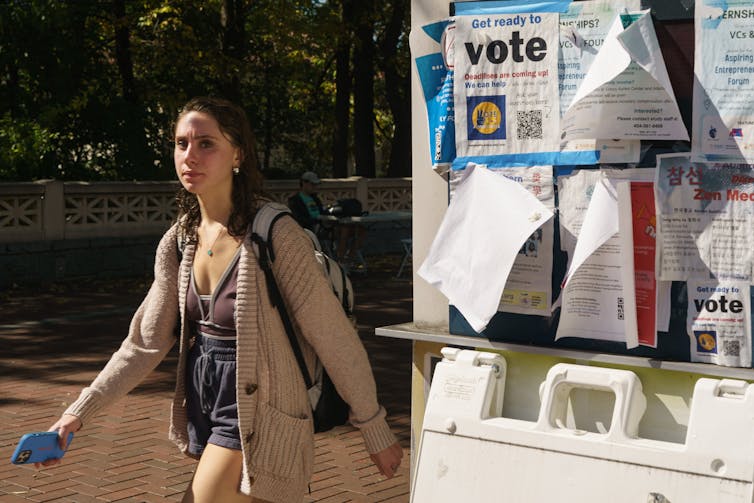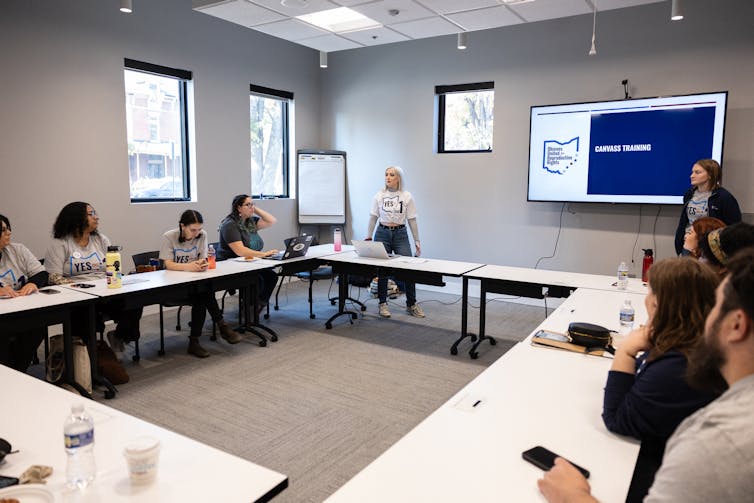Recent polling for the November 2024 election shows that President Joe Biden is struggling with young voters, who have traditionally supported Democrats.
A December 2023 poll showed that 49% of young people supported former President Donald Trump, while just 43% of 18- to 29-year-olds said they preferred Biden.
Biden is even struggling with young people who identify as Democrats. A Fall 2023 Harvard Kennedy School poll shows that just 62% of Democrats aged 18 to 29 years old said they would vote for Biden in 2024.
Many Democrats are increasingly anxious that young voters who supported Biden in 2020 will boycott the general election in 2024, support a third-party candidate or vote for Trump.
Polls this far from Election Day are notoriously variable and not reliable for predicting election results. Furthermore, some political pundits are asking whether young voters will return to the Biden coalition once the campaign season heats up and they learn more about the two candidates.
As scholars of public opinion and the U.S. presidency, we are deeply interested in the prospect of young voters, particularly Democrats, defecting from the Biden coalition.

Mixed evidence on young voters’ support for Biden
About 51% of young voters, aged 18 to 29 years old, identify as Democrats. This compares with 35% of these voters who identify as Republicans. In 2020, young voters in this age group made up an estimated 17% of the electorate.
In a close election, securing the youth vote will be paramount in order for Biden to win reelection.
We wanted to understand how young voters might change their election pick preferences if they learn more about different topics, such as the economy, likely to feature in this election season.
We recruited 1,418 respondents from across the country to participate in an online survey experiment in December 2023, including 860 people who identify as Democrats.
In this experiment, we exposed respondents to different messages that the Biden campaign might employ, to see if young Democrats could be persuaded back to Biden.
A quarter of the respondents saw information about how inflation and unemployment decreased during the Biden administration.
Another quarter of respondents were given information about Trump’s norm-violating behavior, such as encouraging an insurrection at the U.S. Capitol building on Jan. 6, 2021.
The next quarter of respondents were given information about Biden’s and Trump’s positions on abortion, and whether the U.S. should accept immigrants from the Gaza Strip.
The final group of respondents received no information about a particular topic.
In our research, which has yet to be published, we found mixed evidence that undecided young Democrats would be persuaded to vote for Biden based on any new information we shared with them.
Among the people we polled who were given no information, 66% of 18-year-old to 34-year-old Democrats said they would vote for Biden. This roughly tracks with national polling.
Would learning about the strength of the economy boost Biden’s support?
About 69% of young Democrats who read about dropping inflation and unemployment rates said they would vote for Biden, compared with 31% who said they would vote for Trump or another candidate. This reflects a modest increase in support for Biden, compared to people who had no information on this topic.
We then tested whether providing information to voters about the candidates’ policy positions would change support for Biden.
It is possible that voters are just unaware of the candidates’ positions on issues and, after getting more information, will change their views.
We found that 71% of respondents who learned about Biden’s and Trump’s policy positions on abortion and Palestinian refugees from Gaza said they would vote for Biden, compared with the 66% who did not read any new information on these topics before deciding their pick.
Finally, we gave people information about Trump’s norm-violating behavior. This actually marginally decreased support for Biden, dropping from the 66% among people who did not have any of this information given to them in the survey to 63% among people who did. This change, though, lacked what social scientists call statistical significance – meaning that we cannot say this difference is not just attributable to chance alone.
Overall, we found that giving young Democrats access to three different pieces of information generally led to small increases in whether they said they would vote for Biden or not.
Next, we asked respondents “How enthusiastic would you say you are about voting for president in next year’s election?” and how likely they are to vote in the upcoming presidential election. We found that the three different pieces of information each led to a small increase in reported vote intention among young Democrats, but didn’t, on average, increase their enthusiasm about voting. In other words, if young voters feel compelled to vote, they may do so, but without enthusiasm.

The power of persuasion
Taken together, these results show little movement among young Democrats. This is particularly striking when compared to older Democrats in our sample.
When presented with information about the strength of the economy, the candidates’ divergent policy positions or Trump’s norm-violating behavior, support for Biden among likely voters who were 55 years old or older and identified as Democrats increased from 73% to around 90%.
These results suggest an uphill battle for the Biden campaign to bring back young voters. Young voters, even if they identify as Democrats, are perhaps less attached to a party, or democratic institutions more generally, than older voters. This means campaign messages about democratic norms might be less persuasive among younger voters.
On the other hand, there are reasons to expect young voters might return to Biden: The economy is doing well, which tends to help incumbents.
Furthermore, partisanship, particularly in this polarizing environment, remains a powerful influence, and may still exert a pull on young Democrats over the campaign.
Democrats, after all, successfully ran on an anti-Trump campaign in the 2022 midterm elections, 2020 general election and the 2018 midterm elections.

